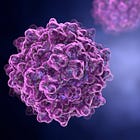Lilly Bets on AI, Prasad Returns, and Brinsupri Breaks Through — This Week in Biotech #65
Plus: The latest on Sarepta’s financial strategy, Insmed’s lung disease win, and Schrödinger’s early-stage setback (August 8–14, 2025).
Hi and welcome to This Week in Biotech by Biotech Blueprint, edition 65, covering biotech & pharma news from August 8th to 14th, 2025.
🎙️ Biotech Blueprint brings you weekly video updates on the latest biotech and pharma news, plus in-depth podcast interviews with industry leaders. You can find us on YouTube, Spotify, and Apple Podcasts.
In the latest episode, I teamed up with the Biotech Capital Compass to break down Sarepta Therapeutics’s recent safety crisis, and what the FDA’s partial green light means for Elevidys, investor confidence, and the broader AAV field. We dig into the science, regulatory dynamics, and what might come next.
And the accompanying article published on Subsatck:
THIS WEEK IN BIOTECH VIDEO SUMMARY
THIS WEEK’S KEY TAKEAWAYS 🔑
Big pharma flexed its AI muscles and pricing power. Eli Lilly signed a $1.3B deal with Superluminal Medicines to co-develop AI-designed small molecules for obesity and cardiometabolic disease. It also hiked Mounjaro prices in Europe and Canada, a move to counter U.S. price controls without hurting margins.
Schrödinger halted its CDC7 inhibitor program after two patients died in a Phase 1 AML trial, a reminder of the limits of preclinical promise, even in AI-assisted drug design.
Sarepta raised $174M by selling its entire Arrowhead stake as it faces pressure on both cash and confidence following Elevidys-linked safety issues. The sale came at a steep discount, adding fuel to investor concerns.
The FDA approved Insmed’s Brinsupri, the first-ever treatment for non-cystic fibrosis bronchiectasis. It’s a big win for patients, though analysts think the stock already priced it in.
Vinay Prasad is back. The controversial head of the FDA’s biologics division returned just two weeks after resigning.
BIOTECH/PHARMA NEWS 🧬
🔹 Eli Lilly has signed a deal worth up to $1.3B with Boston-based Superluminal Medicines to co-develop AI-discovered small molecule drugs targeting obesity and cardiometabolic diseases. The partnership grants Lilly exclusive rights to compounds generated using Superluminal’s proprietary platform, which integrates machine learning, structural biology, and predictive toxicology to unlock G protein-coupled receptors, which are notoriously complex but highly druggable class of targets. The deal structure includes upfront and near-term payments, an equity stake, development milestones, and tiered royalties, but notably excludes Superluminal’s internal lead program, a selective MC4R agonist for rare genetic obesity, expected to enter clinical trials in 2026.
🔹 Schrödinger has discontinued its early-stage CDC7 inhibitor, SGR‑2921, following the deaths of two acute myeloid leukemia (AML) patients in a phase 1 trial. The company had been testing the drug in relapsed/refractory AML and high-risk myelodysplastic syndromes, banking on preclinical data that showed promising anti-leukemic activity. While the molecule showed some monotherapy responses in humans, the decision to discontinue was framed as a matter of patient safety and strategic focus, the path to combination therapy, they noted, would be too difficult to pursue after these events. The company will now focus its efforts on its remaining pipeline assets, including its MALT1 and Wee1 inhibitors.
🔹 Sarepta Therapeutics has sold its entire 9.2M-share stake in Arrowhead Pharmaceuticals, raising $174M in gross proceeds as it looks to extend its cash runway. The move comes as Sarepta faces a slowdown in Elevidys sales following safety concerns and recent patient deaths. The company also returned 2.7M shares to Arrowhead to partially fulfill a $100M milestone payment from their November 2024 siRNA collaboration deal. While Sarepta insists the divestment is strategic, not a reflection on Arrowhead’s tech, the sale values shares at a ~31% discount, pressuring Arrowhead stock, which dropped over 6%. Analysts called the move prudent for Sarepta but flagged ongoing financial risks tied to Elevidys uptake and regulatory uncertainty.
🔹 HHS Secretary RFK Jr. has endorsed mRNA for cancer despite his opposition to its use in COVID-19 vaccines. His administration will continue funding oncology applications while cutting support for infectious disease vaccines.
🔹 Eli Lilly is dramatically raising prices for its diabetes and weight-loss drugs in Europe and Canada, part of a broader effort to shift global pricing in response to U.S. pressure. With the Trump administration pushing a new policy that ties U.S. drug prices to the lowest paid by peer countries, Lilly has opted to increase costs abroad rather than lower them at home. In the UK, prices for its blockbuster drug Mounjaro will jump as much as 170%, while Canadian prices have more than doubled for some formats. Lilly argues that lower prices in the U.S. can only be sustained if other wealthy nations pay more. The company insists public access won’t be affected, with national health systems like the NHS shielded from list price hikes. Still, private payers in Europe and Canada will feel the impact. Lilly also took the opportunity to warn against proposed pharmaceutical tariffs, calling instead for incentives that bolster U.S. manufacturing without compromising affordability or innovation.
🔹 Sanofi has paused supply of Praluent in China due to global production strain and surging demand. While Sanofi works to scale up manufacturing, alternative therapies remain available locally. The move follows a broader trend of foreign companies reassessing product availability in China.
🔹 In a long-awaited milestone, the FDA has approved Insmed’s Brinsupri (brensocatib) as the first and only treatment for non-cystic fibrosis bronchiectasis (NCFB), a progressive and debilitating lung disease affecting over 500k people in the U.S. Brinsupri is a first-in-class oral DPP1 inhibitor that targets neutrophilic inflammation, a root cause of NCFB exacerbations. Approved in both 10 mg and 25 mg doses, the drug significantly reduced flare ups and slowed lung function decline in two large clinical trials, ASPEN and WILLOW. Patients on Brinsupri experienced longer periods without exacerbations and showed meaningful preservation of lung capacity. The therapy was generally well tolerated, with mild skin and dental side effects being the most common. Despite the regulatory win, Wall Street responded with tempered enthusiasm. Morgan Stanley downgraded Insmed to Equal Weight from Overweight, stating that the current valuation already reflects Brinsupri’s near-term commercial potential.
🔹 In an interesting development, Dr. Vinay Prasad has resumed leadership of the FDA’s Center for Biologics Evaluation and Research, just 14 days after stepping down under considerable political and industry pressure. His brief tenure had already stirred significant controversy: from halting Sarepta’s gene therapy shipments following patient deaths, to restricting COVID-19 vaccine approvals in defiance of FDA staff recommendations. The reinstatement, reportedly “at the FDA’s request,” has rattled both investors and observers, not least because no clear explanation has been offered. Biotech stocks with exposure to vaccine and gene therapy regulation (Sarepta, Replimune, Capricor) slid in early trading, reflecting the market’s discomfort with the uncertainty. The whiplash move raises more questions than it answers: Is this a strategic regulatory pivot? An internal power play? Or simply business as usual in the post-COVID FDA?
CLINICAL TRIAL UPDATES 📊
🔹 Vedanta Biosciences will lay off 20% of its staff after its ulcerative colitis candidate VE202 failed to outperform placebo in a phase 2 trial. Once licensed by J&J, the therapy’s failure underscores ongoing struggles to develop effective microbiome-based treatments for inflammatory bowel disease. Vedanta will now focus on VE303, its defined-consortium therapy for C. diff infections, currently in phase 3, and a preclinical therapy targeting antibiotic-resistant bacteria. The company has raised over $300M since its founding in 2010 by PureTech, which now holds a 4.2% stake.
🔹 Response Pharma’s RDX-002 showed promise in a small phase 2 trial for preventing weight regain post-GLP-1 therapy, significantly reducing triglycerides and improving cardiometabolic markers. Larger trials will be needed to validate the effect.
🔹 Novartis posted multiple phase 3 wins for its B-cell–depleting antibody, ianalumab. In two trials enrolling 779 patients with Sjögren’s syndrome, ianalumab significantly reduced disease activity at 52 weeks compared to placebo. The win comes after Novartis dropped its other candidate for Sjögren’s syndrome, iscalimab, earlier this year. ianalumab also delivered a phase 3 victory in the B-cell–driven autoimmune disease primary immune thrombocytopenia (ITP). A four-dose, once-monthly course plus Promacta significantly prolonged time to treatment failure and increased sustained platelet responses at six months versus Promacta alone. Novartis aims to position the therapy as a short-course option for long-term disease control.
🔹 ImmunityBio announced early but striking results from its phase 1 QUILT-106 trial, where two patients with late-stage Waldenstrom macroglobulinemia (WM), a rare form of non-Hodgkin lymphoma, achieved complete responses using the company’s CD19-targeted CAR-NK cell therapy. One patient responded to monotherapy, while the other maintained remission for six months with the addition of rituximab. Importantly, the treatment involved no chemotherapy or lymphodepletion and was delivered entirely in an outpatient setting without major side effects. This marks the first reported complete responses in WM using a chemotherapy-free CAR-NK approach, potentially validating the power of natural killer cell-based therapies in difficult to treat B cell lymphomas. Recruitment is ongoing to confirm durability and broaden the data in this rare cancer subset.
🔹 IO Biotech announced promising results from its phase 3 trial of Cylembio, its off-the-shelf cancer vaccine, combined with Merck’s Keytruda for first-line advanced melanoma. The combo nearly doubled median progression-free survival (19.4 vs. 11.0 months), though the study narrowly missed its predefined statistical threshold. Subgroup analyses were particularly compelling: patients without prior PD-1 treatment and those with PD-L1–negative tumors saw even greater benefits, including a sixfold increase in PFS among the latter. The regimen was well tolerated with no new safety concerns. IO Biotech plans to meet with the FDA this fall to explore a potential path to approval. While the statistical bar was just out of reach, the magnitude and consistency of benefit suggest Cylembio may have a viable path forward.
🔹 Assembly Bio’s long-acting herpes drug ABI-5366 cut viral shedding and lesions by over 90% in phase 1b, with weekly dosing and strong tolerability. Phase 2 trials are planned for 2026 under a Gilead partnership.
AI SUMMARY 🎙️
Listen to our AI-generated podcast below.
Have a great rest of your week and thanks for reading Biotech Blueprint!
👩🏻💻 BIOTECH BLUEPRINT CONSULTING
We have a new consulting website: biotechblueprint.consulting.com!
We provide tailored consulting solutions designed to meet the unique challenges of both established companies and startups. The services span a wide range of strategic and technical needs, including AI automation tools.
BOOK A FREE 30-MINUTE CONSULTATION OR A MEET & GREET below.
DISCLAIMER: This content is for informational purposes only. It should not be taken as legal, tax, investment, financial, or other advice. The views expressed here are my own and do not reflect the opinions of any company or institution.
DISCLOSURE: I have no business relationships with any company mentioned in this article.







My take on Lilly increasing its UK mounjaro price is that the company is buying some goodwill for the US administration. As you stated, it has no impact on the NHS price and represents only a sliver of the UK market in volume terms (which is itself pretty small). A sign of things to come though